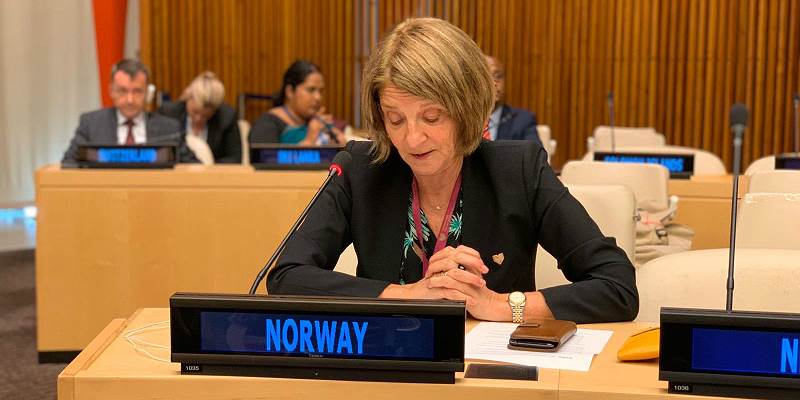Thank you Chair for convening this important discussion.
The very participation of the Peacebuilding Commission Chair in the Women, Peace and Security open debate in the Security Council is a very encouraging practice.
We are pleased to have this opportunity to provide inputs.
I wish to also thank all the briefers this morning.
Starting with these diverse perspectives is an excellent way to frame the rest of our discussions today.
I was particularly struck by the presentation of Ms. Ana Maria Menendez, and would like to recognise her work in linking together the UNSGs office with the work of the Global Alliance of Regional Mediator Networks.
I’d also like to thank Ms. Mavic Cabrera Balleza for her briefing and for leading the Global Network of Women Peacebuilders.
One of the most prominent networks of women peacebuilders; they are locally grounded, but also, certainly, globally connected.
Chair,
From Norway’s perspective, the Women, Peace and Security Agenda is of course about ensuring the rights of women, as well as those of men.
But, it is not only about this.
It is also about operational effectiveness, and achieving lasting peace.
It is clear to us that the Peacebuilding Commission has an important role to play in strengthening the linkages between the Women, Peace and Security agenda and Peacebuilding and Sustaining Peace.
And there are steps the Peacebuilding Commission already are taking to implement this.
Firstly, the adoption of the Peacebuilding Commission Gender Strategy has indeed been laudable.
It is the first of its kind for an intergovernmental body.
It is an excellent tool.
But, we need to fully implement it in order to create the desired results.
Norway warmly welcomes the dedicated effort of the Security Council, including under the Presidency of South Africa, to strengthening the WPS agenda.
In this respect, we must make the best use of the PBC’s advisory role to the Council.
We know the voice of the Peacebuilding Commission in bringing a broad peacebuilding perspective to the Council is particularly relevant in discussions on the formation, renewal and transition of mission mandates.
But we should also take this opportunity to ensure that our input highlights the need for gender indicators and perspectives in mission mandates.
Clearly advising the Council that this Women, Peace and Security perspective is also an integral part of building and sustaining peace.
Chair,
Peacebuilding Commission country visits should also ensure the inclusion of women’s organisations and other aspects of the Women, Peace and Security agenda.
Asa key part of peacebuilding and prevention, Norway provides financial support to civil society efforts towards women’s participation, and rights.
Because we know that, early support means that women are more likely to have political access also in times of conflict.
On this note, allow me to commend the Peacebuilding Fund for its vital contribution to financing organisations promoting the rights of women and youth.
This should continue.
We, the Peacebuilding Commission, also have an opportunity ahead of us presented by the 2020 Review of the Peacebuilding Architecture. Currently in its early phase.
We should ensure that it is indeed a forward-looking review.
And that we are highlighting Women, Peace and Security issues for inclusion and reflection.
As a first step, the Peacebuilding Commission's informal discussion process for the review must be fully inclusive of civil society views who can provide a Women, Peace and Security perspective on peacebuilding.
Thank you again Chair for your engagement on this issue.
What I’ve outlined here is just a starting point, I welcome further discussions with all on these points and others this morning.
